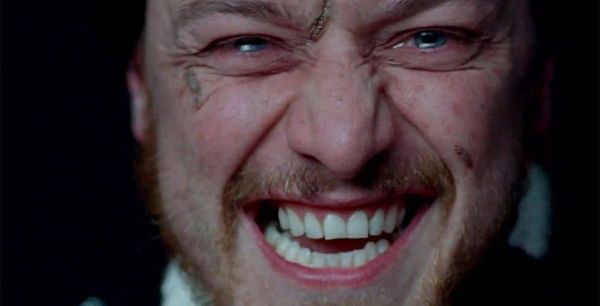Eye For Film >> Movies >> Filth (2013) Film Review

Irvine Welsh's intentionally repellent prose has proved problematic to all who've purposed it for the screen since Danny Boyle set the bar so high with his instant classic Trainspotting adaptation. Paul McGuigan's take on short story anthology The Acid House was perhaps an honorable exception, achieving a truly twisted grubbiness that genuinely fitted the material, even if there wasn't much to it beyond misanthropy and shock value. Cass director Jon S Baird is behind this heavily hyped take on Welsh's Bad Lieutenant-riffing Filth, which already seems destined for cult status and crossover success thanks to a fearless James McAvoy and the appropriately warped style the sizable budget has allowed. However, no amount of Stanley Kubrick pastichery and gross-out humor can toilet-paper over the cracks in a narrative that's as wayward as its protagonist, and as usual many of Welsh's would-be controversial tactics are hopelessly juvenile.
Bruce Robertson is the wrong arm of the law, a cop with anti-social habits so severe his criminal behavior puts him beyond even the crooks he can barely be bothered chasing. The prospect of a promotion offers some redemption for his fractious relationship with his wife, and also allows Bruce to indulge in 'the games', his elaborate schemes to destroy the lives of his colleagues and their chance as competition to him. With the pressure to crack a murder case mounting, Bruce's amoral antics start to spiral dangerously out of control, and his deteriorating physical and mental condition could see him lose more than just his job.

Getting off to a cracking start, Filth immediately sets its juvenile stall with McAvoy's sneering voice-over and Bruce's workplace flatulence eliciting easy laughs despite frequently throwaway racism and homophobia and the childishness of the humor. Some of the stinging satire of Scottish culture - via images of Irn Bru and Buckfast-swilling slobs - is well played, but the setting is confusing: if it's meant to be set at the time the book was written, the references to one of the characters as 'metro-sexual' and the chavvy style of the NEDs contradicts the Nineties period. It all feels a little dated, and not in a good way.
The sexual deviancy on display also feels like a watered down hangover from Welsh's other work - there's nothing as outrageously filthy as the infamous climax to The Acid House's first segment, with poor Kate Dickie given the thankless role of erotic asphyxiation adulteress in Ai No Corrida-echoing scenes that are uncomfortably played for laughs. Shirley Henderson, on the other hand, is a scene-stealing delight as a literally squeaky - but definitely not clean - housewife whose obscene phone-sex relationship with Bruce's bizarre Frank Sidebottom-inspired alter-ego provides some of the juiciest moments.
The cast in general all contribute spirited turns, with a plethora of local talent from Gary Lewis to Martin Compston putting in reliably fine work and even superficially miscast English stars Imogen Poots and Jamie Bell proving tolerable in spite of their under-written roles. Eddie Marsan is particularly plummy as Bruce's repressed Masonic lodge buddy, but their hedonistic Hamburg getaway feels like it was drafted in purely to appease Hangover fans. Of course, it's an integral part of the novel, but it feels curiously obligatory here, much like many of the inconsequential plot strands, not least of which being the racially motivated murder.
Baird's hyper-kinetic style is in acknowledged tribute to A Clockwork Orange - the murder takes place in an underpass unmistakably lit to emulate Kubrick's own iconic shot - but it often feels forced and too on-the-nose, with over-done lighting and an annoyingly intrusive soundtrack. Many of his flourishes feel borrowed from Nicolas Winding Refn - particularly the jarring Bronson-style cabaret cut-aways - and the surreal sequences featuring a manic, forehead-enhanced Jim Broadbent (inexplicably replacing the novel's tapeworm) are only intermittently successful, though they have a mounting Gilliam-esque intensity that does eventually become effectively unsettling.
The main problems undoubtedly lie with the source material - it just seems dated and obvious, with the subject matter being too scatter-shot for any of it to become particularly engaging. As with his deplorable Maribou Stork Nightmares, some of Welsh's recurring pre-occupations tow a fine line between representing ignorance and perpetuating it - aside from the uproarious Christmas party set-piece, most of the laugh-out-loud moments come from the characters' offensive patter. When racial, chauvinist and homophobic slurs generate the most mirth - and that's if viewers are being generous - you have to wonder about the material as well as its target audience's hype-fueled acceptance of it. It all culminates in a gratuitous and depressingly predictable 'twist' that's as ill-conceived as it is irresponsible, handled with about as much skill as an Eighties B-movie.
It's sad to see McAvoy's raving, raging talent gone to waste on something so patchy - he truly is the best thing about Filth and does manage to transcend the script, wringing some actual emotion from more serious scenes even though they're patronisingly scored to remind you that Baird is trying to temporarily shift the tone away from the snorting, shagging shenanigans elsewhere. These brief dramatic dalliances offer insubstantial respite but also feel like a bit of a cop-out, as Filth is ultimately neither as funny nor as shocking as it desperately wants to be. It's still worth a watch for the rollicking first half and the handful of memorable performances, but the wait for a worthy successor to Trainspotting is far from over.
Reviewed on: 01 Oct 2013


















